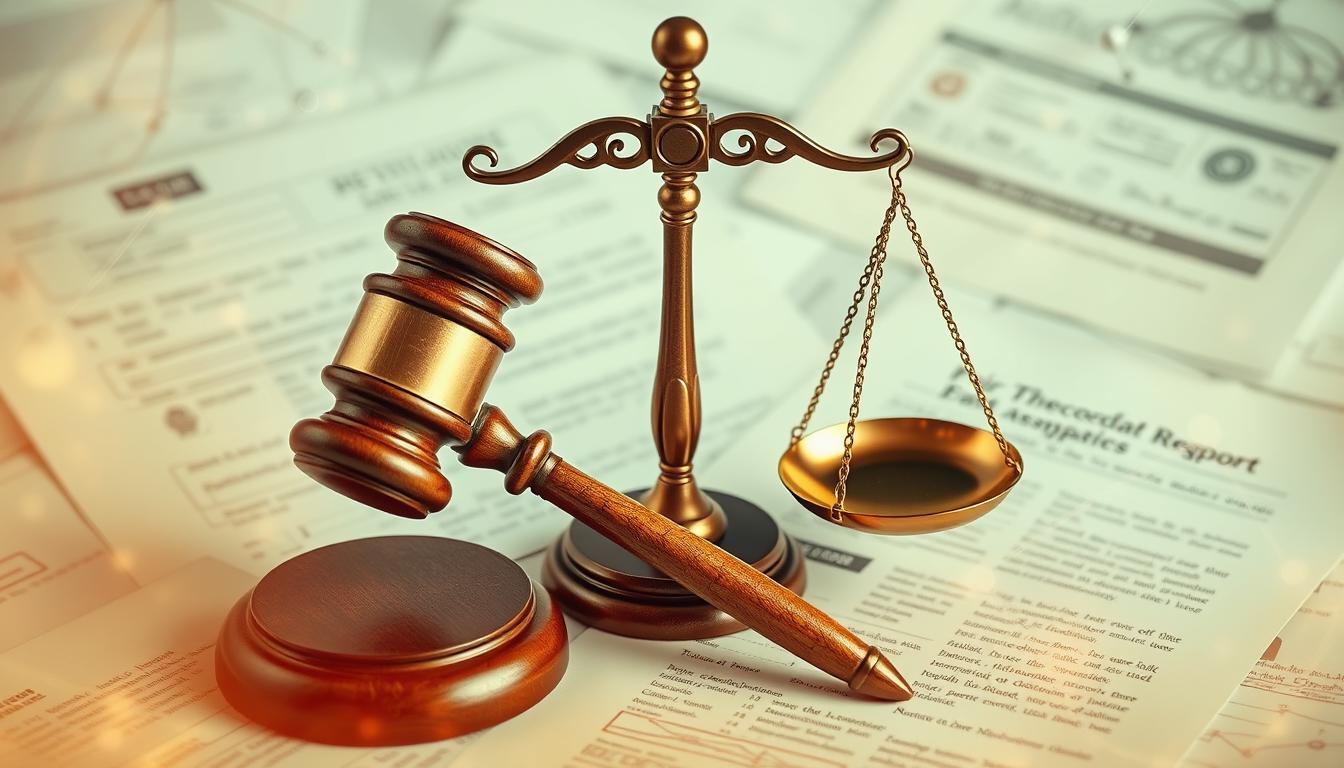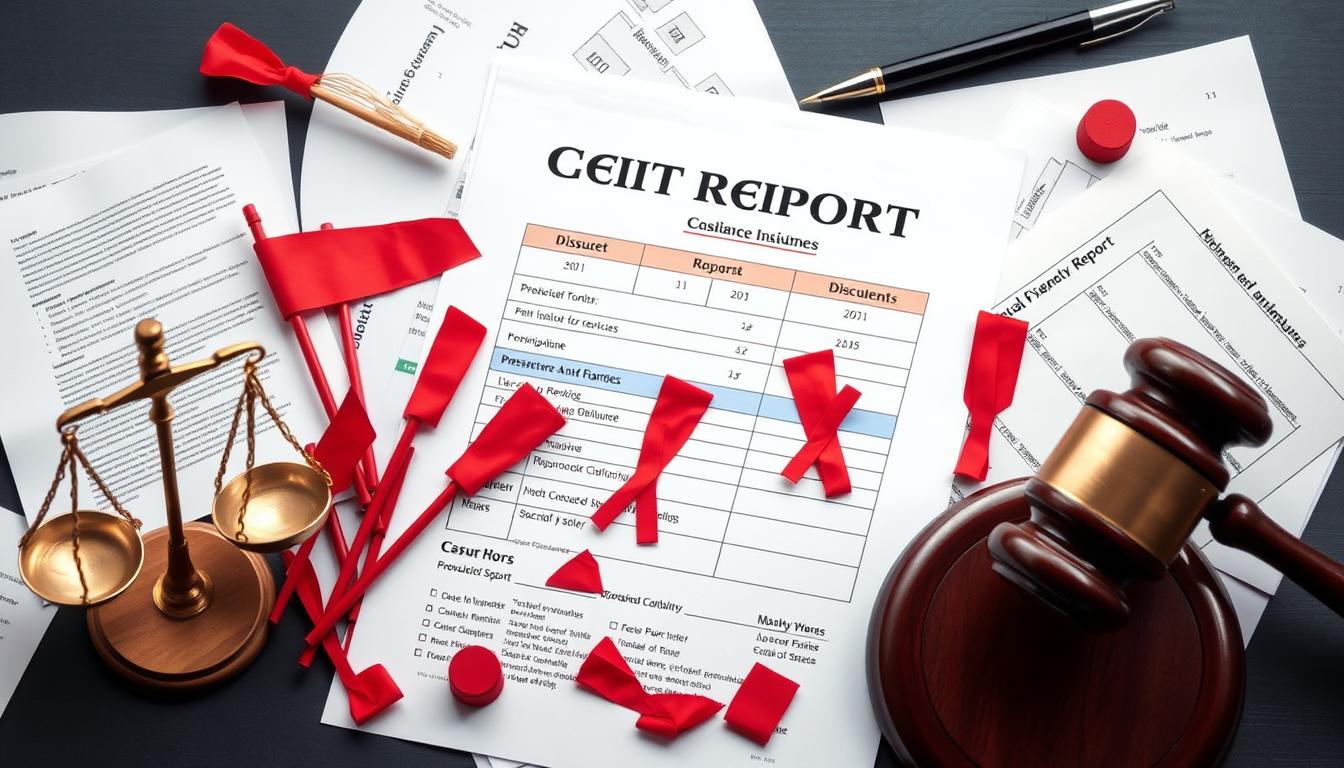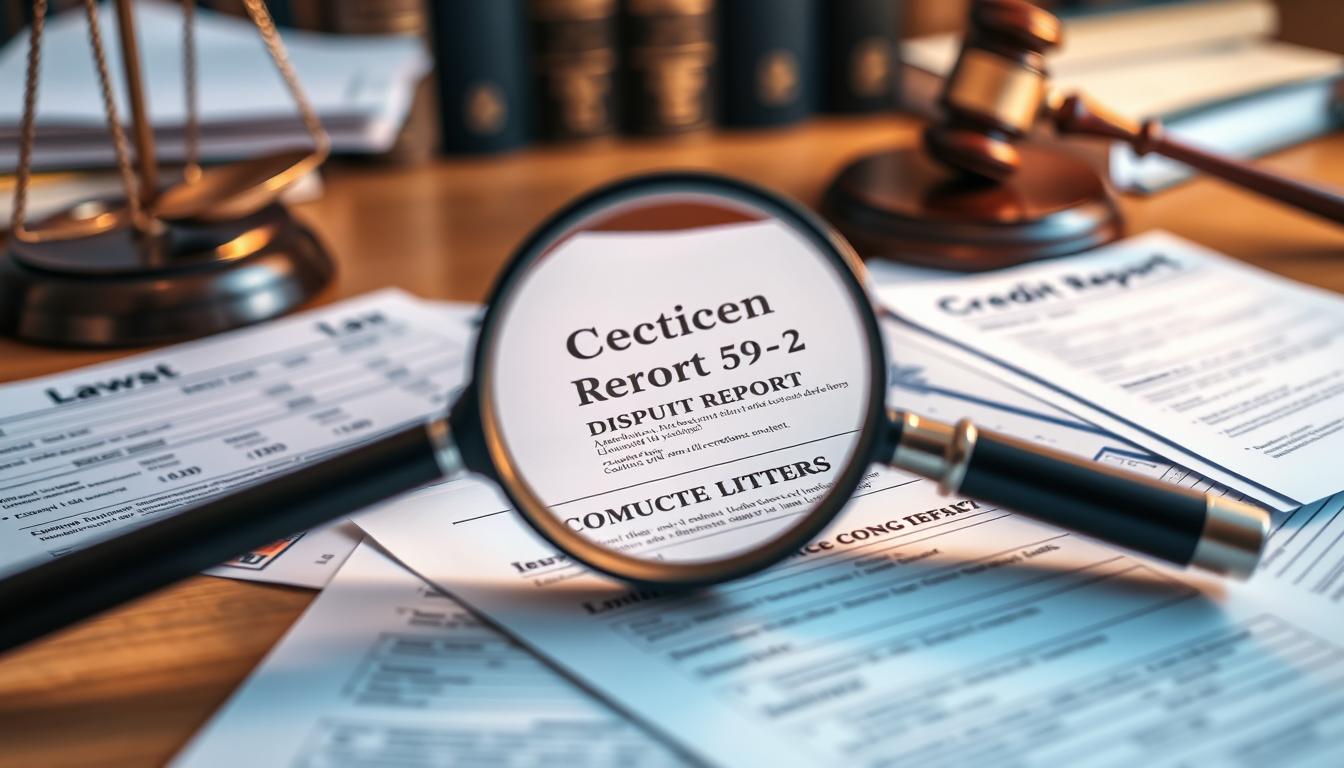Inaccurate credit reporting can harm your financial well-being. The Fair Credit Reporting Act (FCRA) protects consumers and allows them to sue credit bureaus. This guide explores legal options for holding credit bureaus accountable for errors.
We’ll discuss grounds for lawsuits against credit bureaus and steps to build a solid case. You’ll learn how to seek damages or credit score corrections through legal action.
Key Takeaways
- The Fair Credit Reporting Act (FCRA) grants consumers the right to dispute inaccurate credit information and hold credit bureaus accountable for credit report errors.
- Credit report errors can have a significant impact on your credit score, financial opportunities, and overall quality of life.
- Grounds for suing the credit bureaus include FCRA violations, failure to investigate disputes, and negligence in maintaining accurate credit data.
- Building a strong case against the credit bureaus requires meticulous documentation, evidence gathering, and effective dispute strategies.
- Pursuing legal action can lead to monetary damages and credit score corrections, ensuring credit bureau accountability and protecting your financial future.
Understanding Credit Bureau Negligence
Credit report errors can severely impact your financial health. They can limit your access to credit and hurt your credit score. Credit bureaus, despite their role, can make mistakes that affect your financial future.
Knowing the causes of inaccurate credit data is vital. It helps you take steps to protect your financial well-being. Understanding how these errors affect you is equally important.
Common Causes of Inaccurate Credit Data
Credit report errors can stem from various sources. These include identity theft, name mix-ups, and credit agency system errors.
Identity theft can lead to fake accounts in your name. Mix-ups can add someone else’s information to your report.
Credit bureau negligence can result in wrong data in your file. This inaccurate credit data can cause problems for years.
Impact of Credit Report Errors on Your Life
Credit report errors can have severe, far-reaching consequences. Wrong information can lead to loan and credit card denials.
It can also affect job opportunities. Many employers and landlords use credit reports for decision-making.
Credit score damages from these errors can be costly. They can lead to higher interest rates on loans, costing you thousands over time.
“Credit report errors can devastate your financial well-being. They limit access to credit, jobs, and housing. Be proactive in disputing inaccuracies to protect your financial future.”
Fair Credit Reporting Act: Your Legal Protections
The Fair Credit Reporting Act (FCRA) protects your rights regarding credit reports. It outlines credit bureaus’ responsibilities and provides a framework for disputing inaccurate information. This federal law covers Equifax, Experian, and TransUnion.
The FCRA grants you several important rights. You can access free credit reports annually from major bureaus. You’re also allowed to dispute any errors found in these reports.
Under the FCRA, you’re entitled to free reports in specific situations. These include adverse actions based on your report or identity theft victimization. You can also have inaccurate information corrected or removed.
- Access your credit reports from each of the three major credit bureaus for free once a year
- Dispute any errors or inaccuracies you find on your credit reports
- Receive a free copy of your credit report if a company takes adverse action against you (such as denying a loan or credit application) based on the information in your credit report
- Receive a free copy of your credit report if you are the victim of identity theft
- Have any inaccurate information corrected or removed from your credit report
The FCRA holds credit bureaus accountable for accurate and complete information. If a bureau fails to investigate or correct errors, you may sue for violations.

Knowing your FCRA rights helps protect your credit report’s integrity. It safeguards you from the harmful effects of credit report errors. Take charge of your financial health today.
Grounds for Suing the Credit Bureaus
Credit bureaus must follow the Fair Credit Reporting Act (FCRA). If they fail, you can sue them for damages. This law ensures accurate credit reports and protects consumers’ rights.
FCRA Violations and Credit Score Damages
The FCRA sets rules for credit bureaus to investigate disputes and update information. Violations can occur in several ways.
- Failure to investigate disputed information in a timely and thorough manner
- Neglecting to remove inaccurate, incomplete, or unverifiable information from credit reports
- Reporting outdated or obsolete negative items that should have been removed
These violations can harm your credit score. They may lead to credit denials and higher interest rates. You might also miss job and housing chances.
Consumers can seek damages for these issues. The law allows you to sue credit bureaus for financial hardships caused by their mistakes.
| FCRA Violation | Potential Damages |
|---|---|
| Failure to investigate disputes | Lowered credit score, denied credit applications, higher interest rates |
| Reporting inaccurate information | Decreased credit score, difficulty obtaining loans, mortgages, or rentals |
| Refusing to remove outdated negative items | Prolonged credit score damage, financial stress, missed opportunities |
Know your rights under the FCRA. This knowledge helps protect your credit and financial health. Take action if credit bureaus violate the law.
Disputing Credit Reports: The First Step
Wrong info on your credit report can hurt your chances of getting loans or jobs. The Fair Credit Reporting Act (FCRA) lets you challenge mistakes on your credit report.
Effective Dispute Strategies and Documentation
To fix your credit, dispute credit report errors with the credit bureaus. Use smart tactics and keep good records to win your dispute.
- Look over your credit report for credit report errors or FCRA violations.
- Collect proof like receipts, bills, or identity theft evidence to back up your claim.
- Write to credit bureaus about the mistakes and include your evidence.
- Keep track of your dispute and follow up if needed.
Stay determined when disputing credit report errors. Take action to hold credit bureaus responsible for fixing mistakes.

Fighting credit report errors is key to fixing FCRA violations. Use these tips to improve your credit report’s accuracy.
sue the credit bureaus
Credit bureau negligence can harm your financial well-being. You may have the right to sue the credit bureaus and seek justice. Lawsuits can hold these companies accountable for their actions.
Suing credit bureaus is complex but effective. It can address inaccuracies in your credit report. You can also obtain compensation for damages caused.
Understanding your legal rights is crucial. Knowing the grounds for a successful lawsuit is important. These steps help you regain control of your credit profile.
Key Considerations for Suing Credit Bureaus
- Identify the specific violations of the Fair Credit Reporting Act (FCRA) committed by the credit bureaus
- Document the tangible damages you’ve suffered, such as a lower credit score or denied credit applications
- Gather evidence to support your claims, including correspondence with the credit bureaus and any relevant documentation
- Determine the appropriate legal actions to take, such as filing a lawsuit or pursuing alternative dispute resolution
- Consult with an experienced attorney who specializes in credit bureau lawsuits to ensure the best possible outcome
Suing credit bureaus can protect your financial future. It’s a way to hold these companies accountable. You can seek justice for their negligence.
“The credit bureaus have a responsibility to provide accurate and reliable information. When they fail to do so, they must be held accountable.”
The key to a successful credit bureau lawsuit is gathering evidence. Understanding your legal options is crucial. Work with a knowledgeable attorney for guidance.
With the right approach, you can achieve your desired outcome. You can regain control of your credit profile. Take action to protect your financial well-being.
Building a Solid Case Against Credit Bureaus
A strong case against credit bureaus needs thorough evidence gathering and preparation. Your lawsuit’s foundation is the collected documentation. It shows credit bureau lawsuits, FCRA violations, and how their negligence affected your life.
Evidence Gathering and Preparation
To build a compelling case, gather various types of evidence. This includes copies of your credit reports from all three major bureaus.
Collect documentation of your disputes with credit bureaus. Save letters, emails, and any responses you received. Keep proof of harm caused by credit report errors.
Record financial losses or emotional distress from credit bureau lawsuits. This evidence shows FCRA violations and their impact on your life.
- Copies of your credit reports from all three major credit bureaus, highlighting the inaccuracies and errors.
- Documentation of your disputes with the credit bureaus, such as letters, emails, and any responses received.
- Proof of the harm caused by the credit report errors, such as denied credit applications, increased interest rates, or the inability to secure housing or employment.
- Records of any financial losses or emotional distress resulting from the credit bureau lawsuits.
| Type of Evidence | Importance |
|---|---|
| Credit reports | Showcases the inaccuracies and errors in your credit data |
| Dispute documentation | Demonstrates your efforts to correct the errors and the credit bureaus’ response |
| Proof of harm | Quantifies the tangible impact of the credit report errors on your life |
| Financial and emotional records | Supports the claim for monetary damages and credit score correction |

Organizing this evidence strengthens your case against credit bureaus. It helps you seek justice for the wrongs you’ve experienced.
Navigating the Legal Process
Taking legal action against credit bureaus can be challenging. Understanding the key stages will help you prepare for the journey ahead. Let’s explore the process step by step.
Filing a lawsuit is the first step. You’ll need to draft a complaint outlining the credit bureau’s negligence. It should also detail the damages you’ve suffered due to their credit bureau lawsuits.
After filing, the discovery phase begins. Both parties exchange information and evidence to build their case. You’ll gather documents like credit reports and correspondence with the bureaus.
- During the discovery phase, you’ll need to gather documentation, such as credit reports, correspondence with the credit bureaus, and any other relevant records.
- The next stage is the deposition, where you and the credit bureau representatives will be questioned under oath about the legal process and the issues at hand.
- If the case doesn’t settle out of court, it will proceed to trial, where both sides will present their arguments and evidence before a judge or jury.
Working with an experienced attorney is crucial. They can guide you through the complex legal system. Your lawyer will ensure your rights are protected at every stage.
| Stage | Description |
|---|---|
| Filing the Lawsuit | Drafting a complaint outlining the credit bureau’s negligence and the damages you’ve incurred. |
| Discovery Phase | Exchanging information and evidence between both parties to build their respective cases. |
| Deposition | Questioning you and the credit bureau representatives under oath about the legal process and the issues at hand. |
| Trial | Presenting arguments and evidence before a judge or jury if the case doesn’t settle out of court. |
The legal process is complex, but proper preparation can lead to success. With the right guidance, you can hold credit bureaus accountable. You may also receive the compensation you deserve.
Potential Outcomes and Compensation
Suing credit bureaus successfully may lead to various forms of compensation. You could receive monetary damages for harm caused by inaccurate reports. Additionally, your credit score might be corrected.
Monetary Damages for Credit Score Damages
Winning a lawsuit against credit bureaus can result in monetary damages. This compensation covers harm caused by their negligence or Fair Credit Reporting Act violations.
- Decreased credit scores and the resulting financial consequences
- Denied or more expensive loans, credit cards, or other financial products
- Difficulty finding employment or housing due to poor credit
- Emotional distress and mental anguish caused by the credit report errors
Correction of Credit Score
A successful lawsuit can lead to the correction of your credit score. Credit bureaus may have to remove inaccurate information from your report. This action can improve your credit score and restore your creditworthiness.
Credit score correction can have far-reaching benefits. It can help you access better financial opportunities. Your overall financial well-being may improve as a result.

“Winning a lawsuit against the credit bureaus can not only provide monetary compensation but also the essential correction of your credit score, which can have a transformative impact on your financial future.”
Alternative Dispute Resolution Options
Legal action against credit bureaus isn’t always the best choice for resolving disputes. Alternative dispute resolution (ADR) offers a more cost-effective and efficient solution. These methods can help address inaccuracies in your credit report quickly.
Mediation and arbitration are two common ADR methods. Mediation uses a neutral third party to help negotiations. Arbitration involves an impartial arbitrator who reviews evidence and makes binding decisions.
Exploring ADR options for credit bureau disputes has several benefits. These include faster resolution and potentially lower costs than court proceedings. ADR also offers increased privacy and more control over outcomes.
- Faster resolution timelines compared to traditional litigation
- Potentially lower costs than going through the court system
- Increased privacy, as ADR proceedings are often kept confidential
- Maintaining more control over the outcome, rather than relying on a judge or jury
Alternative dispute resolution may not suit every credit report error. However, it’s worth considering for efficient and cost-effective solutions. Consult a legal professional to determine the best approach for your situation.
| Mediation | Arbitration |
|---|---|
| Voluntary process with a neutral third-party facilitator | Formal, binding process with a neutral arbitrator |
| Focuses on negotiation and compromise | Involves presenting evidence and arguments to the arbitrator |
| Allows for more control over the outcome | Arbitrator’s decision is final and legally binding |
| Often faster and less expensive than litigation | Can be more efficient and cost-effective than going to court |
Choosing the Right Attorney for Credit Bureau Lawsuits
Picking the right lawyer is vital for your credit bureau lawsuit’s success. A good attorney can make or break your case. Evaluate their qualifications and experience in credit report disputes carefully.
Find a lawyer who specializes in consumer protection laws, especially the Fair Credit Reporting Act. They should have a history of winning credit bureau cases. An expert attorney can navigate complex laws and build a strong case.
- Inquire about the attorney’s success rate in credit bureau lawsuits and their ability to recover damages for clients.
- Ensure the attorney understands the FCRA and other relevant laws that protect consumers from credit report errors and abuse.
- Ask about the attorney’s approach to gathering evidence, negotiating settlements, and, if necessary, taking the case to trial.
Look for a lawyer with good communication skills and a client-focused approach. They should keep you informed throughout the legal process. Your attorney should work hard to protect your rights and interests.
| Qualification | Importance |
|---|---|
| FCRA Expertise | Crucial for effectively navigating credit bureau lawsuits |
| Successful Track Record | Demonstrates the attorney’s ability to achieve positive outcomes for clients |
| Communication and Responsiveness | Essential for keeping you informed and ensuring your needs are met throughout the legal process |
Research potential credit bureau lawsuit attorneys thoroughly. This helps ensure you have the best legal counsel to fight for your rights. Your chosen lawyer should seek the justice you deserve.
Preventing Future Credit Report Errors
Keeping your credit report accurate is vital. Regular checks and credit monitoring can protect your financial health. These steps help minimize the risk of future credit report errors.
Regularly reviewing your credit reports from the three major credit bureaus is crucial. This helps you spot and fix any issues quickly. Prompt action prevents negative impacts on your credit score.
A credit monitoring service can be a powerful ally. It watches your credit reports and alerts you to changes. This allows for swift action to protect your credit.
Proactive Steps to Prevent Credit Report Errors
- Review your credit reports from all three major credit bureaus regularly (at least once a year).
- Enroll in a credit monitoring service to stay informed of any changes or suspicious activity on your credit reports.
- Promptly dispute any errors or inaccuracies you find on your credit reports with the respective credit bureaus.
- Keep detailed records of all communication and documentation related to your credit report disputes.
- Stay vigilant in monitoring your credit and financial information to quickly identify and address any issues.
These proactive steps can help maintain an accurate credit profile. Your diligence in monitoring your credit information is key. It’s the first step towards credit bureau accountability.
“Preventing credit report errors is crucial for maintaining a strong financial foundation. Staying on top of your credit information is the best defense against the negative impacts of inaccurate data.”
Conclusion
Suing credit bureaus can be a valid option for inaccurate credit reports. Understanding your rights under the Fair Credit Reporting Act is crucial. With effective dispute strategies, you can seek justice and fair compensation.
Legal action against credit bureaus isn’t always simple. However, proper guidance can help overcome challenges. Your credit score impacts your financial health, so protect it from unfair marks.
Stay persistent in ensuring your credit reports’ accuracy. This vigilance safeguards your credit score. Taking proactive steps can lead to a more secure financial future.

